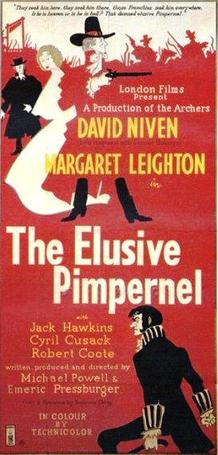The Elusive Pimpernel (1950 film)
| The Elusive Pimpernel (The Fighting Pimpernel) | |
|---|---|
 Theatrical poster | |
| Directed by | Michael Powell Emeric Pressburger |
| Written by | Baroness Orczy (novels) Michael Powell Emeric Pressburger |
| Produced by | Michael Powell Emeric Pressburger |
| Starring | David Niven Margaret Leighton Jack Hawkins Cyril Cusack Robert Coote |
| Cinematography | Christopher Challis |
| Edited by | Reginald Mills |
| Music by | Brian Easdale |
Production company | |
| Distributed by | British Lion Films (UK) Carroll Films (US) |
Release dates | 6 February 1950 (UK) 17 April 1954 (NYC) 1955 (US general) |
Running time | 109 minutes |
| Country | United Kingdom |
| Language | English |
| Budget | £477,000[1][2] |
| Box office | £133,354 (UK)[3] |
The Elusive Pimpernel is a 1950 British period adventure film by the British-based director-writer team of Michael Powell and Emeric Pressburger, based on the novel The Scarlet Pimpernel (1905) by Baroness Emmuska Orczy. It was released in the United States under the title The Fighting Pimpernel. The film stars David Niven as Sir Percy Blakeney (a.k.a. The Scarlet Pimpernel), Margaret Leighton as Marguerite Blakeney and features Jack Hawkins, Cyril Cusack and Robert Coote. Originally intended to be a musical, the film was re-worked as a light-hearted drama.
Plot
During the French Revolution, the Scarlet Pimpernel (David Niven), who is really Sir Percy Blakeney in disguise, risks his life to rescue French noblemen from the guillotine and take them across the English Channel to safety. As cover, Sir Percy poses as a fop at Court, and curries favour with the Prince of Wales (Jack Hawkins) by providing advice about fashion, but secretly he leads The League, a group of noblemen with similar views.
Chauvelin, French Ambassador of the Revolution to England (Cyril Cusack) wants to find out who the Pimpernel is and bring him in to meet his fate under French justice. When evidence points to Sir Percy, Chauvelin blackmails Blakeney's wife, Marguerite (Margaret Leighton) by threatening to expose her criminal brother Armand (Edmond Audran), but Marguerite doesn't believe her husband is capable of being the daring Pimpernel.
Cast
- David Niven as Sir Percy Blakeney/ The Scarlet Pimpernel
- Margaret Leighton as Marguerite Blakeney
- Jack Hawkins as Prince of Wales/Footpad attacking Lord Anthony
- Cyril Cusack as Chauvelin
- Robert Coote as Sir Andrew Ffoulkes
- Arlette Marchal as Contesses de Tournai
- Gérard Nery as Philippe de Tournai
- Danielle Godet as Suzanne de Tournai
- Edmond Audran as Armand St. Juste
- Charles Victor as Colonel Winterbotham
- Eugene Deckers as Captain Merieres
- David Oxley as Captain Duroc
- Raymond Rollett as Bibot
- Philip Stainton as Jellyband
- John Longden as The Abbot
- Robert Griffiths as Trubshaw[4]
- Patrick Macnee as the Hon. John Bristow
Production
The Elusive Pimpernel was financed by Samuel Goldwyn and Alexander Korda. Neither director Michael Powell nor star David Niven was very interested in doing the film, but had their minds changed by threats of contract suspension. (Rex Harrison had been originally announced as the star.)[5] Powell wanted to make the film as a musical, but was not allowed to, and Margaret Leighton was cast despite his objection. Goldwyn forced numerous additions and changes to the film but when Powell delivered the final cut, Goldwyn refused to make the final payment, which caused Korda to sue him.[6]
The film was shot in 1949[7] at various British film studios in Boreham Wood, Elstree and Shepperton, Surrey. Location shooting took place in Bath, Dover, in Savernake Forest, on the Marlborough Downs, and in the stables of Carlton House Terrace, St. James's, London. In France, filming took place in the chateaux of the Loire Valley and on Mont Saint-Michel.[6][8]
The Elusive Pimpernel was released in the UK in 1950, but because of the falling out between Korda and Goldwyn, did not gain an American distributor until July 1953 when Carroll Pictures acquired the rights. The film then premiered in New York City on 17 April 1954.[6]
Niven's unhappiness at being forced to make the film later led to him severing his contract with Samuel Goldwyn.[9]
References
Notes
- ^ Karol Kulik, Alexander Korda: The Man Who Could Work Miracles, Virgin 1990 p. 319
- ^ Kevin Macdonald (1994). Emeric Pressburger: The Life and Death of a Screenwriter. Faber and Faber. p. 316. ISBN 978-0-571-16853-8.
- ^ Vincent Porter, 'The Robert Clark Account', Historical Journal of Film, Radio and Television, Vol 20 No 4, 2000 p. 492
- ^ "Trubshaw" was a name often given to minor characters in Niven's films (at his insistence) – it was a back-handed tribute on Niven's part to his old army friend, Michael Trubshawe.
- ^ "BIG LINE-UP FOR ENGLAND". The Daily News. Perth: National Library of Australia. 19 April 1947. p. 20 Edition: FIRST EDITION. Retrieved 6 July 2012.
- ^ a b c TCM Notes
- ^ TCM Overview
- ^ IMDB Filming locations
- ^ "DAVID NIVEN'S OWN STORY". The Australian Women's Weekly. National Library of Australia. 15 September 1971. p. 15. Retrieved 7 July 2012.
Bibliography
- Christie, Ian. Arrows of Desire: the films of Michael Powell and Emeric Pressburger. London: Faber & Faber, 1994. ISBN 0-571-16271-1. 163pp (illus. filmog. bibliog. index)
- Orczy, Baroness. The Scarlet Pimpernel. London: Hutchinson & Co, 1905.
- Orczy, Baroness. The Elusive Pimpernel. London: Hutchinson & Co, 1908.
- Powell, Michael. A Life in Movies: An Autobiography. London: Heinemann, 1986. ISBN 0-434-59945-X.
- Powell, Michael. Million Dollar Movie. London: Heinemann, 1992. ISBN 0-434-59947-6.
External links
- The Elusive Pimpernel reviews and articles at the Powell & Pressburger Pages
- The Elusive Pimpernel at IMDb
- The Fighting Pimpernel at the TCM Movie Database
- The Elusive Pimpernel at AllMovie
- The Elusive Pimpernel at the BFI's Screenonline. Full synopsis and film stills (and clips viewable from UK libraries).
